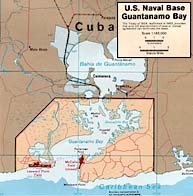Gitmo Pirate Base
 |
|
|
|
|
At the breakup of the old US, her offshore possessions were often left to their own devices. How each of them faced this is the source of many modern-day epics.
At Guantanamo Bay, the marines, sailors and naval aviators saw their respective homelands leaving the union one by one. The general feeling was one of disillusionment; unionism was strong and few were willing to accept the new order of things. Those who felt more strongly for the new nations left and those who stayed did so either because they had nowhere to go or because they felt a loyalty to something that no longer existed.
 |
|
|
|
|
Nowadays, Gitmo is one of the most secure and well-organized pirate havens in America. The old naval ships are mostly hulks, but still provide excellent bases for flying boats, and the AA guns are very nice to have. Relations with Cuba have also improved dramatically; Gitmo provides a major boost to the local economy, now that all perishables are bought from islanders. And a friendly Cuba is a guarantee that a land invasion is impossible. Gitmo's own defenses makes an air or naval attack very costly.
 |
|
|
|
|
Gitmo is ruled by a council of captains. Anyone having either a naval vessel of destroyer class or greater, or a squadron of four or more aircraft, can sit on the council. The rules are simple. When all else fails, duels and contests of seamanship are common ways to settle conflicts.
The rules for all, including outsiders:
- Traders are welcome on Smugglers Island
- Robbery and fraud is punishable by 20 lashes and reimbursement
- Fighting is allowed, but striking a man down is punishable by 20 lashes
- Murder, rape, slavery, spying, sabotage and treason are capital offenses
The rules for pirates:
- Only pirates in the base proper
- New pirates must prove themselves in a test
- Pirates must have a tattoo to prove their allegiance
- No guns may be used on base
- Each captain must post a shore patrol of 5 to maintain order.
[Mercenary patrols are available for hire.] - No raiding without informing the harbormaster beforehand.
- Each captain should set aside 5% of his loot (before expenses) for the maintenance of the port and another 5% for widows, invalids and the poor (at his discretion).
- All must aid in the defense of the port, failure is considered treason.
Gitmo allows raids against 'traitor' territories; that is all former US nations except Columbia and (for some strange reason) the Atlantic Coalition. Claiming a home in the Disputed Territories may also work as a deterrent. Foreign nations and Caribbean regions are strictly off-limit, but any country at war with or occupying any part of the former US are legal targets. Thus, raids against French shipping is allowed, and Mexico and Spain and their possessions are legal targets since the Mexico-Texas war of 1930. Dutch and British ships are usually left alone.
Registered raids are secret, but the harbormaster will inform pirates planning to strike the same target, and try to negotiate. Often, several bands will cooperate to strike the same target. There are even mercenary bands waiting in constant readiness, available for hire as rescue parties and reinforcements on demand. In some cases, such mercenaries will even work for shipping companies, but never for those from 'traitor' territories. Naturally, their prices are exorbitant.
Aircraft on the water.
Gitmo is still very much a naval base. Though air pirates are taking in a growing share of the loot, and this is recognized by the four-plane-only captaincy requirement, it is still the former navy that rules. Naval traditions govern language, customs, punishments; this reinforces the 'Caribbean' feeling.
The law within pirate gangs vary; some are ruled by a dictatorial captain, others by a charismatic ruler, others are democratic or anarchic. The old bands were all former Gitmo base personnel, but now new bands have formed along ethnic and linguistic lines, or simply founded by a charismatic leader or reputable raider. Most captains obey the laws of Gitmo, but some raid as they please, only seeking refuge in Gitmo when they have to and cheating on the dues. Friction is on the rise, but the captains council still has enough cohesion to control the situation.